旅游英语第二册unit 3 Talking about Itinerary[精]
【旅游英语】Unit 5 Talking about the Itinerary
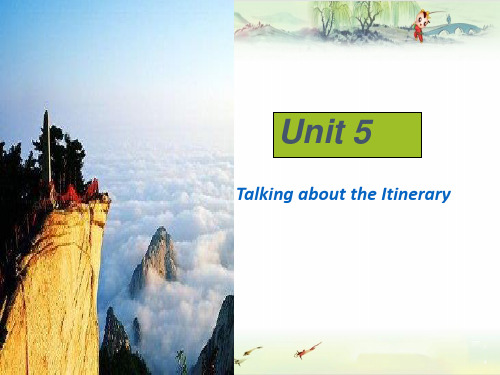
• dynasty /'dɪnəstɪ/ n. 王朝;朝代
• establish /ɪ'stæblɪʃ/ vt. 建立,创建
• ancient /'eɪnʃənt/ adj. 古代的;古老的
• spot /spɒt/ n. 地点,场所
•
v. 弄上污渍
• palace /ˈpæləs/ n. 宫,宫殿
the Drum Tower
Situational Conversations
Conversation 1 Conversation 2
Conversation 1 Words and Expressions
Notes
Conversation 1
A Tour guide is talking about the itinerary with the tourists.
B: Sounds good!
A: OK, here is a copy of our travel itinerary. Please check carefully and let me know if you want any change, OK?
B: Thank you.
Words and Expressions
A: Absolutely right. 13 dynasties in Chinese history once established their capital in Xi’an. It’s really an ancient city. So in your two-day travel itinerary, we will see many famous spots, such as the Terra-cotta Warriors and Horses, the Huaqing Palace, the Big Wild Goose Pagoda, the Bell Tower, the Drum Tower and so on. And we will also visit Xi’an Jiaotong University and do some shopping at the downtown area. What’s your idea?
中英文翻译中英文对照旅游英语口语
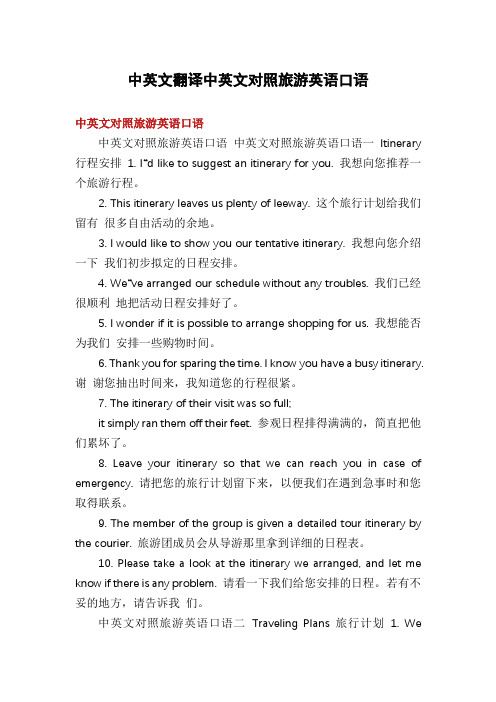
中英文翻译中英文对照旅游英语口语中英文对照旅游英语口语中英文对照旅游英语口语中英文对照旅游英语口语一Itinerary 行程安排1. I“d like to suggest an itinerary for you. 我想向您推荐一个旅游行程。
2. This itinerary leaves us plenty of leeway. 这个旅行计划给我们留有很多自由活动的余地。
3. I would like to show you our tentative itinerary. 我想向您介绍一下我们初步拟定的日程安排。
4. We“ve arranged our schedule without any troubles. 我们已经很顺利地把活动日程安排好了。
5. I wonder if it is possible to arrange shopping for us. 我想能否为我们安排一些购物时间。
6. Thank you for sparing the time. I know you have a busy itinerary. 谢谢您抽出时间来,我知道您的行程很紧。
7. The itinerary of their visit was so full;it simply ran them off their feet. 参观日程排得满满的,简直把他们累坏了。
8. Leave your itinerary so that we can reach you in case of emergency. 请把您的旅行计划留下来,以便我们在遇到急事时和您取得联系。
9. The member of the group is given a detailed tour itinerary by the courier. 旅游团成员会从导游那里拿到详细的日程表。
10. Please take a look at the itinerary we arranged, and let me know if there is any problem. 请看一下我们给您安排的日程。
旅游英语

Situation Two Meeting GuestsⅠ. Translate the following passage into Chinese.到机场迎接游客是整个旅游接待过程首个重要步骤。
有句英语谚语:“好的开始是成功的一半”,它强调了开始的重要性。
作为一名合格的导游员,从一开始你就应该扮演好导游员的角色,你应该热心、幽默、周到。
机场迎接客人的程序包括:找到客人,问候客人,点人数和检查行李,然后领客人上车。
在整个接待过程中,你都要欢迎客人到你的城市,你的国家,并询问他们有什么问题和要求。
表示提供服务的诚挚愿望,祝愿客人住得开心,玩得愉快。
Ⅱ.Translate the following sentences into English.1. On behalf of Guangxi China International Travel Service,I warmly welcome to you to visit our city.2. We’ll be at your service at any time, and do everything possibl e to make your visit a pleasant experience.3. Thank you very much for coming all this way to meet me in person.4. We are so happy to have friends like you coming from afar.5. Nanning is known as a green city . It has been confirmed as the permanent venue for the China-ASEAN Expo (CAEXPO).Situation Three ;At the HotelⅠ. Translate the following passage into Chinese.费用及服务:住旅馆时,要问清哪些是免费的(free)哪些是收费的(extra charge)。
王迎新版《导游英语》课程标准
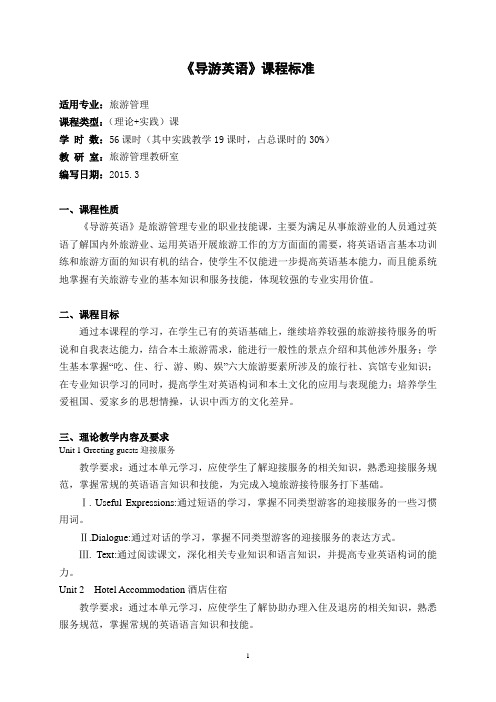
《导游英语》课程标准适用专业:旅游管理课程类型:(理论+实践)课学时数:56课时(其中实践教学19课时,占总课时的30%)教研室:旅游管理教研室编写日期:2015.3一、课程性质《导游英语》是旅游管理专业的职业技能课,主要为满足从事旅游业的人员通过英语了解国内外旅游业、运用英语开展旅游工作的方方面面的需要,将英语语言基本功训练和旅游方面的知识有机的结合,使学生不仅能进一步提高英语基本能力,而且能系统地掌握有关旅游专业的基本知识和服务技能,体现较强的专业实用价值。
二、课程目标通过本课程的学习,在学生已有的英语基础上,继续培养较强的旅游接待服务的听说和自我表达能力,结合本土旅游需求,能进行一般性的景点介绍和其他涉外服务;学生基本掌握“吃、住、行、游、购、娱”六大旅游要素所涉及的旅行社、宾馆专业知识;在专业知识学习的同时,提高学生对英语构词和本土文化的应用与表现能力;培养学生爱祖国、爱家乡的思想情操,认识中西方的文化差异。
三、理论教学内容及要求Unit 1 Greeting guests迎接服务教学要求:通过本单元学习,应使学生了解迎接服务的相关知识,熟悉迎接服务规范,掌握常规的英语语言知识和技能,为完成入境旅游接待服务打下基础。
Ⅰ. Useful Expressions:通过短语的学习,掌握不同类型游客的迎接服务的一些习惯用词。
Ⅱ.Dialogue:通过对话的学习,掌握不同类型游客的迎接服务的表达方式。
Ⅲ. Text:通过阅读课文,深化相关专业知识和语言知识,并提高专业英语构词的能力。
Unit 2 Hotel Accommodation酒店住宿教学要求:通过本单元学习,应使学生了解协助办理入住及退房的相关知识,熟悉服务规范,掌握常规的英语语言知识和技能。
Ⅰ. Useful Expressions:通过背景的学习,掌握协助有课办理酒店入住和退房的基本步骤和习惯用词。
Ⅱ.Dialogue:通过对话的学习,掌握常用的表达方式和服务要点。
旅游服务英语课后答案
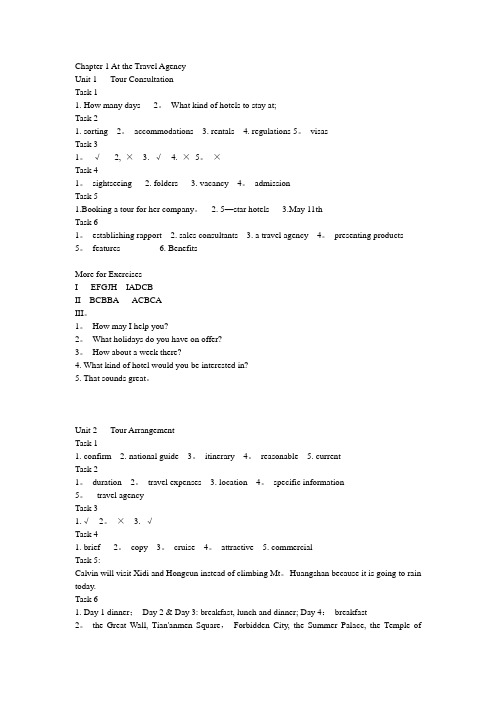
Chapter 1 At the Travel AgencyUnit 1 Tour ConsultationTask 11. How many days 2。
What kind of hotels to stay at;Task 21. sorting 2。
accommodations 3. rentals 4. regulations 5。
visasTask 31。
√2, × 3. √ 4. ×5。
×Task 41。
sightseeing 2. folders 3. vacancy 4。
admissionTask 51.Booking a tour for her company。
2. 5—star hotels3.May 11thTask 61。
establishing rapport 2. sales consultants 3. a travel agency 4。
presenting products5。
features 6. BenefitsMore for ExercisesI EFGJH IADCBII BCBBA ACBCAIII。
1。
How may I help you?2。
What holidays do you have on offer?3。
How about a week there?4. What kind of hotel would you be interested in?5. That sounds great。
Unit 2 Tour ArrangementTask 11. confirm2. national guide 3。
itinerary 4。
reasonable 5. currentTask 21。
duration 2。
travel expenses 3. location 4。
specific information5。
听力教程第二册unit3听力原文
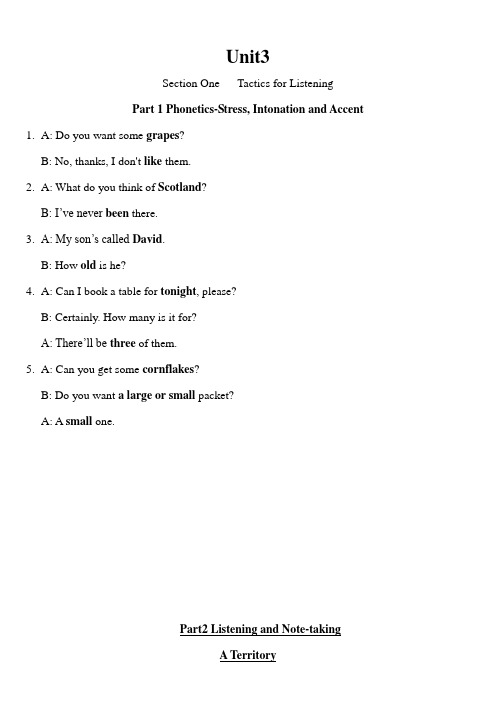
Unit3Section One Tactics for ListeningPart 1 Phonetics-Stress, Intonation and Accent 1.A: Do you want some grapes?B: No, thanks, I don't like them.2.A: What do you think of Scotland?B: I’ve never been there.3.A: My son’s called David.B: How old is he?4.A: Can I book a table for tonight, please?B: Certainly. How many is it for?A: There’ll be three of them.5.A: Can you get some cornflakes?B: Do you want a large or small packet?A: A small one.Part2 Listening and Note-takingA TerritoryWhen we talk about a territory, we mean a defended space. Animals have their territories, which they mark out with their personal scent. The scent is their territorial signal. Human beings have other territorial signals. There are three kinds of human territory, marked by different territorial signals.First, there are the Tribal Territories, which in modem terms are known as countries. Countries have a number of territorial signals. The borders are often guarded by soldiers and they usually have customs barriers, flags, and signs. Other signals of the tribal territory are uniforms and national anthems. These signals are important, because they warn the visitor that he is entering a foreign country and, while he is there, he must behave like a visitor.Second, there is the Family Territory, at the center of which is the bedroom. This is usually as far away as possible from the front door. Between the bedroom and the front door are the spaces where visitors are allowed to enter. People behave differently when they're in someone else's house. As soon as they come up the driveway or walk through the front door -- the first signals of family territory -- they are in an area which does not belong to them. They do not feel at home, because it is full of other people's belongings -- from the flowers in the garden to the chairs, tables, carpets, ornaments, and other things in the house. In the same way, when a family goes to the beach or to the park for a picnic, they mark out a small territory with towels, baskets, and other belongings; other families respect this, and try not to sit down right beside them.Finally, there is the Personal Territory. In public places, people automatically mark out an area of personal space. If a man enters a waiting room and sits at one end of a row of chairs, it is possible to predict where the next man will sit. It won't be next to him or at the other end ofthe room, but halfway between. In a crowded space like a train, we can't have much personal territory, so we stand looking straight in front of us with blank faces. We don't look at or talk to anyone around us.Exercise A:1. When we talk about a territory, we mean a defended space.2. These signals are important, because they warn the visitor that he is entering a foreign country.3. People behave differently when they're in someone else's house.4. In public places, people automatically mark out an area of personal space.5. It won't be next to him or at the other end of the room, but halfway between.A TerritoryI. Territory, a defended spaceA. Territory is marked by territorial signals.a. Animals mark out their territories with their personal scent, their territorialsignals.│b. Human beings have three kinds of human territory, marked by differentterritorial signals.II. Three kinds of human territoryA. Tribal Territories or countriesa. Countries have a number of territorial signals.1.The borders,guarded by soldiers, with customs barriers,flags, andsigns2. Uniforms and national anthems.B. Family Territorya. Family Territory1.The front door.2. The driveway.b. When a family goes to the beach or to the park for a picnic, they mark out asmall territory with towels, baskets, and other belongingsC. Personal Territorya. In public places people automatically mark out an area of personalspace.b. In a crowded space, we stand looking straight in front of us with blankfaces.section two listening comprehensionpart 1 DialoguesDialogue I Credit Card—I recently touring around America found there was a chap I was with ... He ... we were booked in by an American organization into a hotel, paid for by them, but they would not lethim go through the lobby to his room unless they had a credit card number to prove that he was a human being that was trustworthy, {right, right}. In other words we've got to the stage now with credit cards, however friendly you look, however wealthy you look, or however nice you look ... (That's right, it doesn't matter, they just want to see that number.) Excuse me, where is your credit card?—Because you know you can't rent a major automobile in the States, you know, you can't rent without, without using a credit card, you can't, you know like you were saying, go into a hotel ...—I think that what's underneath that is the society in which you're only good if you have numbers attached to you, (Mm.) that are computerized, (Yeah.) and can trace you, and everybody's insured against everybody else (Yeah.) and ... that side of credit I find rather upsetting.— It's kind of ugly, isn't it?— Like a lot of people ,it's a great facility, if you're disciplined with it.1.D2. D3. CDialogue 2 Card Insurances— I'll tell you about one awful experience that happened to me, erm, I took out, erm ... one of these card insurances that cover all your cards (Mm.) should your cards be stolen and I hadmy handbag snatched* in a store and immediately got the store security, who were very quick, got me into their office and we phoned all of the credit cards that I had on me, within ten minutes.— Which is what they tell you to do?—Yeah. When, I suppose by the time we’d got to all of them it about half an after the bag had been snatched. Got up to the top floor of the office, started ringing round, and the whole thing was done within half an hour. Erm, when the bag was snatched it went through apparently a chain of people, out of the store, and it went two miles away and they managed to ... three different people had spent over £2,000 on four of my cards ...—But you're only liable* for the first 50.—I wasn't liable for any of it. Because thank goodness I had this insurance.—None of it. Yeah.—But ...—Touch wood* quick. That was ...—.. They'd spent it within twenty minutes of stealing.—That's incredible, isn't it?—And the thing that absolutely horrified me was I was close to limits on two of the cards, the ones that I do clear every month (Mm – mm.) I was close to the limit I'm allowed on those, and they, both of those cards they went into banks, said they were me, and got (No!) well over what the top limit would have been.—Really! Well it just goes to show, you could walk into a bank and get more than you could possibly ever pay off*!—I couldn't probably, because I go in, and they say, "No, you've spent it all already?—Right, right.1. F2. F 3, F 4. T 5. T 6. T 7. F 8.TPassage 1 Credit CardsThe system of bank credit cards operates in much the same way as a store credit account except that the holder is not restricted to making purchases in one place.Cards can be presented at any place where the bank card sign is displayed, and that could be at a shop, a service station, a hotel, a restaurant or in fact at all kinds of businesses.The sales assistant imprints the card details onto a sales voucher* which the customer signs, and the card is then returned to the customer. Each month the bank sends the holder a credit card statement setting out where purchases were made and totalling what is owing. A payment has to be made within 25 days of the date of the statement, but not necessarily the full amount. If the customer pays in full within this time the use of the card does not cost anything, But if he decides to pay only the minimum repayment shown on the statement –£5 or 5% of the outstanding* balance*, which- ever is the greater -- he automatically chooses to use the system's extended repayment facility. The remaining balance is then carried forward and attracts interest at the rate of 2.25% per month.Bank credit cards are more versatile than store credit accounts in that they also enable people to obtain cash .Any bank displaying the bank card sign will arrange a cash advance* for a card holder, whether or not be is one of their own customers. For money drawn in this waythe bank makes a charge at the rate of 2 25% a month calculated. cash advances appear on the monthly bank card statement.The bank credit card system operates entirely separately from cheque accounts but nevertheless it is a customer's previous relationship with his bank that is used as a guide to the amount of credit he will be extended. When a card is issued a personal credit limit is imposed indicating the maximum that can be owing at any one time. This is confidential* between customer and bank and does not appear on the card.Exercise A:The system of bank credit cards operates in much the same way as a store credit account except that the holder is not restricted to making purchases in one place. Bank credit cards can be presented at any place where the bank card sign is displayed and in fact at all kinds of businesses. Bank credit cards also enable people to obtain cash.Exercise B:1. A2. C3. C4. B5. D6. D7.B8. BExercise C:1. Bank credit cards can be presented at any place where the bank card sign is displayed, e.g. ata shop, a service station, a hotel, a restaurant, etc.2. Each month the bank sends the holder a credit card statement setting out where purchases were made and totalling what is owing.3. The customer can pay in full within 25 days of the date of the statement or he can pay only the minimum repayment shown on the statement4. Because they also enable people to obtain cash.5. When a card is issued a personal credit limit is imposed indicating the maximum that can beowing at any one time.Part 3 NewsNews Item 1Thousands of public workers have begun to demonstrate violently against a retirement reform plan passed by Brazilian lawmakers Wednesday. Demonstrators clashed with riot police in front of Congress after the chamber of deputies approved the measure. Brazilian media reports say at least 60 people were injured. Some demonstrators said the president had betrayed them by seeking approval of the measure in Congress. The measure is designed to cut retirement assistance, raise the retirement age of public workers and tax their retirement money. The government says the changes are necessary to save the government thousands of millions of dollars.Exercise A:This news item is about public workers' reaction to a retirement reform plan passed by Brazilian lawmakers.Exercise B:Thousands of public workers have begun to demonstrate violently against a retirement reform plan passed by Brazilian lawmakers Wednesday. Demonstrators clashed with riot police in front of Congress after the chamber of deputies approved the measure.Some demonstrators said the president had betrayed them by seeking approval of the measure in Congress. The measure is designed to cut retirement assistance, raise the retirement age of public workers and tax their retirement money.News Item 2According to a report to Congress, more than 4.5 million students endure sexual misconduct* by employees at their schools, from inappropriate jokes all the way to forced sex.The best estimate available shows nearly one in l0 kids faces misbehavior ranging from unprofessional to criminal sometime between kindergarten and 12th grade.The report, delivered to Congress on Wednesday, is the first to analyze research about sexual misconduct at schools.Some educators took issue with the way the report combines sexual abuse with other behaviors such as inappropriate jokes, in one broad category of sexual misconduct.Exercise A:This news item is about prevalent sexual misconduct endured by students according to a report to Congress.Exercise B:1.B2. D3. C4. ANews Item 3The recession and the prospect of another strike in Hollywood could combine to make it a miserable New Year for the entertainment business.The global credit crunch* is making it much more difficult for studios to get funding for big budget pictures. High-earning actors are being asked to lower their expectations and accept more modest salaries.The Screen Actors Guild has said it will ballot its 120,000 members on a possible strike, although it needs a 75 percent vote in favor before a walkout* can be authorized by the union's leaders.The mood of many is that now is not the time to rock the boat* and that the fight over payments for work on the Internet should wait until a later date.Exercise A:This news item is about the impact of recession on Hollywood.Exercise B:1. F2. T3.T4. F5. T6.F。
大学旅游英语教材答案

大学旅游英语教材答案Unit 1: Destination VocabularyQuestion 1: Match the words and phrases with their definitions.1. a. Itinerary - a plan or a detailed schedule of a trip2. h. Souvenir - a memento or a reminder of a trip3. c. Luggage - suitcases or bags used for carrying personal belongings during a trip4. g. Visa - an official document permitting entry into and travel within a foreign country5. d. Currency - the money used in a particular country6. e. Boarding pass - a document that allows a passenger to board a plane7. b. Guidebook - a book providing information and guidance for travelers8. f. Departure - the action of leaving or starting a tripQuestion 2: Complete the sentences with the given words.1. E - itinerary2. D - currency3. C - luggage4. F - departure5. B - guidebook6. A - souvenirUnit 2: DialoguesQuestion 1: Listen to the recordings and answer the questions.1. The man is asking for directions to the nearest subway station.2. The woman suggests taking Bus 26 instead of the subway.3. The man wants to know how long it takes to get to the airport by subway.4. The woman advises the man to take the express train, which takes only 20 minutes.5. The man needs to transfer to Line 3 in order to reach the airport.6. The woman mentions that the subway operates from 5:30 am to 11:30 pm.Unit 3: Reading ComprehensionQuestion 1:1. False - The article states that traveling can broaden one's horizons and enhance cultural understanding.2. True - The article suggests that learning a foreign language is beneficial for travel enthusiasts.3. True - The article mentions that traveling provides opportunities for self-discovery and personal growth.4. False - The article does not specifically state that travel can make people more attractive.5. True - The article suggests that experiencing different cultures can promote tolerance and empathy.Question 2:1. traveling can broaden one's horizons and enhance cultural understanding.2. learning a foreign language.3. opportunities for self-discovery and personal growth.4. experiencing different cultures promotes tolerance and empathy.Unit 4: Communicative FunctionsQuestion 1: Complete the dialogues with suitable questions or statements.1. Can you recommend any popular tourist attractions in this city?2. How long does it take to get to the airport from here?3. What time does the museum close today?4. I'm looking for a nearby hotel. Do you know any good options?5. Excuse me, could you take a photo of us, please?Question 2: Role-play the following situation.A: Excuse me, can you tell me how to get to the nearest train station?B: Sure! Go straight this way, then turn left at the second intersection. The train station will be on your right.A: Thank you so much for your help!B: You're welcome. Have a safe journey!Overall, the answers provided in this document are based on the given questions from the university tourism English textbook. It is important for students to thoroughly understand and practice these concepts to improve their language skills in the context of travel.。
旅游英语综合教程最新版教学课件实战版Unit 3
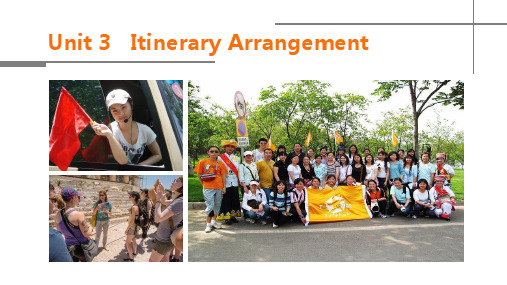
Background Information
Prior to the arrival of a tour group, the tour guide or the tour coordinator is normally required to make a detailed study of the reception program, and draft a preliminary itinerary with reference to the age-bracket, occupations and tastes of all the group members. However, travel arrangements should be left to be coordinated with the tour leader, upon the arrival of the tour group. Itinerary co-ordination is generally indispensable to the smooth implementation of a travel program. As buyers of tourist products, the tourists are entitled to know the various services and tourist items which they will be provided with. Therefore, when it comes to itinerary confirmation, it would be unwise and unacceptable for a tour guide to impose his personal interests or ends upon his guests. On the contrary, he shall subject himself to the accepted practice of regarding tourists as supreme, rendering an array of superb services and coordinating the travel arrangements with his guests on the basis of mutual equality.
- 1、下载文档前请自行甄别文档内容的完整性,平台不提供额外的编辑、内容补充、找答案等附加服务。
- 2、"仅部分预览"的文档,不可在线预览部分如存在完整性等问题,可反馈申请退款(可完整预览的文档不适用该条件!)。
- 3、如文档侵犯您的权益,请联系客服反馈,我们会尽快为您处理(人工客服工作时间:9:00-18:30)。
大连理工大学出版社
Unit Three Talking about Itinerary
大连理工大学出版社
Situational Dialogue Unit Three
Talking about Itinerary
Dialogue Two
At ABC Travel Service, Jocelyn is now receiving a visitor, Mr. Smith, who wants to take a family tour to Yunnan
Vocabulary
Dialogue Two
highlight
n.
精华
quotation
n.
报价
accommodation
n.
食宿
大连理工大学出版社
Situational Dialogue Unit Three
Talking about Itinerary
Dialogue One
Jocelyn, a Cantonese local tour guide, is paying a visit to her tourists, Mr. & Mrs. Smith, talking with them about their
U新ni世t T纪hre高e 职高专 Talking旅ab游ou管t I理tin专era业ry 系列规划教材
新世纪高职高专教材编审委员会 组编 主编彭华 大连理工大学出版社
(第三版)
Background Material Unit Three
Talking about Itinerary
Tips for Reference
n.
神圣的遗物, 遗迹, 纪念物
paradise
ቤተ መጻሕፍቲ ባይዱ
n.
天堂
commerce gourmet sandstone topography 大连理工大学出版社
n.
商业
n.
美食家
n.
砂岩
n.
地形, 地貌
Situational Dialogue Unit Three
Talking about Itinerary
As a receptionist at travel service, while talking about a travel plan with tourists, the following seven steps are for your references:
1. Talk to travelers and find out what they want. 2. Start by listing everything they’ d like to see. Circle their destinations on a map. Have a reason for every stop. 3. Establish a route and timeline. Figure out a logical geographical order and length for their trip. Write down any places that they have to be on a certain date. 4. Decide on the cities they’ ll fly in and out of. 5. Determine the mode of transportation. 6. Make a rough itinerary. Taking into account the length of their vacation, write in the number of days they’ d like to stay in each place. Carefully consider travel time to get an idea of how long various journeys will take. 7. Adjust by cutting, streamlining, or adding to fit their timeline or budget.
J: Good. I’ ve come here to talk over with you our travel plan in China. Here is a copy of the itinerary from your Travel
Service.
A: Ok. Let’ s go over it again.
impressed with its unique natural southern features, lots of cultural and historic relics and well-known Cantonese
cuisine.
S: Yeah. We know that it is a paradise of commerce and gourmet.
J: As you see from the itinerary, first you will sightsee the most famous historical and prosperous city in the southern
part of China, which locates on the line of the Tropic of Cancer—Guangzhou for two days. I’ m sure you’ ll be deeply
travel plan in Canton.
A: Mr. Aaron Smith
S: Mrs. Smith
J: Jocelyn, a local tour guide
J: Good afternoon, Mr. and Mrs. Smith. Have you settled down?
A: Yes, the room is comfortable. We like it.
大连理工大学出版社
Situational Dialogue Unit Three
Talking about Itinerary
Vocabulary
Dialogue One
itinerary
n.
crystal
n.
tropic
n.
日程表 水晶, 清澈透明的 回归线
unique
adj.
独特的, 唯一的
relic
